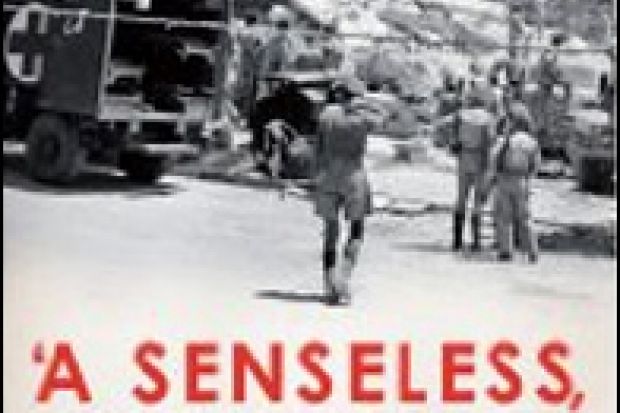There is no promotion after Jerusalem." So said Ronald Storrs, the first governor of the city under the British Mandate for Palestine after the First World War, as he was packed off to become governor of Cyprus. He typified those for whom the redemption - as they saw it - of Palestine was no mere imperial venture, but a moral mission with world-historical significance.
Sadly, they were a minority, and their mission ended in 1947-48 not just in failure, but in humiliation, as Britain presided over the collapse of civil order and the onset of "the Catastrophe" (al-Nakbah) in which most of the Palestinian Arab population were expelled from their homeland. It is perhaps not surprising that Britain's contribution to the Palestine conflict has tended to be erased from the national memory. Although there is no shortage of books about the Arab-Israeli conflict, remarkably few of them focus on the crucial period before the state of Israel was established.
Norman Rose does; despite its title, his book actually starts from the first international Zionist Congress at Basle in 1897, and a third of it deals with the years before 1945. This long time frame will make it useful to readers approaching the problem for the first time, although to cover such a period in barely 200 pages, the narrative has to push on at a fair pace. Some important issues do not get as much analysis as perhaps they need, while some familiar stories are retold at length. A full six pages are devoted to a precis of one well-known book, I.F. Stone's Underground to Palestine.
But Rose also presents less familiar viewpoints from private letters and diaries, and he is a lucid, humane and fair-minded guide to a hugely contentious history. His fair-mindedness is indeed almost overdone at times, for example when he introduces the Holocaust as "the mass killing of Jews (and Gypsies, Slavs and homosexuals)". He deals sensibly with the charges of anti-Semitism levelled at some British rulers of Palestine, and his judgment on the Colonial Office officials who obstructed the path of Jewish refugees from Nazi-controlled Europe to Palestine is a model of perceptive restraint.
It is probably asking too much of any author to produce an absolutely neutral account of such events. At some points, Rose's account cleaves to what may be called the official Zionist version. It is probably impossible, for instance, to take a neutral view of the nation-building programme of the Jewish community in Palestine, the Yishuv. To Jews it was all but miraculous, while to others it was exclusivist, if not actually racist. Rose's treatment of the White Paper produced in 1930 by the Labour Colonial Secretary Lord Passfield (Sidney Webb) sidesteps its sharp criticism of the Zionist policy of exclusive Jewish employment, which dismayed many supporters of Zionism who had believed that it would bring economic benefits to Arabs as well as Jews.
Likewise, Zionist opposition to the British idea of introducing limited self-government stays in fuzzy focus here. Rose says that the final Legislative Council proposal was "overtaken by the outbreak of the Arab rebellion of 1936", whereas it had been abandoned by the government in face of opposition in Parliament (believed by Arabs to be produced by Jewish pressure) before the rebellion began. Indeed, many would see the collapse of the proposal as one of the key causes of the rebellion.
The most contentious and serious issues, of course, are raised by the "squalid war" of Rose's title (the words were Winston Churchill's). Rose's account of Zionist terrorism, and British attempts - led by Field-Marshal Montgomery - to crush it, is unimpeachably judicious. But once again, he seems almost too fair-minded in dealing with the British failure to intervene in the first attacks of the revisionist terrorists on the ordinary Arab population. British condemnation of the upper-class Arabs who bolted and left their people leaderless may be well taken. But although Rose fully admits the "wanton savagery" of the Deir Yassin massacre, his account echoes the British as well as the official Zionist view of the Catastrophe as an accident of war they were powerless to affect.
His dismissal of the arguments of the so-called "new historians" for a deliberate Zionist policy of forced "transfer" is too airy to be of real service to the reader. A "careful and responsible scrutiny", he says, shows that "Plan Dalet", held by historians such as Ilan Pappe to have aimed at ethnic cleansing, was entirely defensive in intent. (The implication that Pappe is careless and irresponsible makes it ironic that Rose gets the name of Pappe's publisher wrong.) Yet the plan's wording he quotes, "to gain control of the areas of the Hebrew state", must be read in the light of David Ben-Gurion's public assertion in December 1947 that "only a state with 80 per cent Jews is viable". And the point, surely, is that Ben-Gurion was making perfect sense. The terrorists' war may have been squalid, but it was certainly not senseless.
'A Senseless, Squalid War': Voices from Palestine 1945-1948
By Norman Rose. The Bodley Head, 288pp, £20.00. ISBN 9780224079389. Published 19 March 2009
Register to continue
Why register?
- Registration is free and only takes a moment
- Once registered, you can read 3 articles a month
- Sign up for our newsletter
Subscribe
Or subscribe for unlimited access to:
- Unlimited access to news, views, insights & reviews
- Digital editions
- Digital access to THE’s university and college rankings analysis
Already registered or a current subscriber? Login
